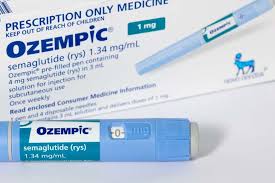“Ozempic and GLP-1 agonists: Miracle weight-loss drugs or risky trends? Explore benefits, side effects, ethical debates, and long-term impacts of semaglutide and tirzepatide. Learn if they’re right for you.”
In 2023, world attention turned to a new diabetes drug not for maintain blood sugar levels but for its unique side effect: it helped shed off pounds at an astonishing rate. Ozempic, together with its siblings, Wegovy and Mounjaro is always on the tip of everyone’s tongues, the new buzz on social media platforms, and is currently trending. There are some celebs who take pride in their transforming looks while some pharmacies are on the verge of running out of supplies, while their patients scramble to get the prescriptions on time. At the same time there paints an intricate picture of medical advances, ethical challenges, and so many questions yet to be addressed. In this article we focus on the science, hazards and social impacts of GLP-1 agonists ousting the stereotyped norms of society.
What Are GLP-1 Agonists?
GLP-1 (glucagon-like peptide-1) agonists are a pc of meds that were intended to help people suffering from type 2 diabetes. They’re designed to imitate the action of the GLP-1 hormone responsible for blood sugar and appetite levels. They are also extremely important in the treatment of obesity.
The key players include: –
Ozempic (semaglutide) – was approved by the fda for treating diabetes and is now used outside of prescriptions for weight loss too.
Wegovy (semaglutide) – Semaglutide was previously used for diabetes also but has now been licensed for the treatment of obesity and is a higher dose version
Mounjaro (tirzepatide) – It works on both GLP-1 and GIP hormones which results in better results when it comes to losing weight.
How Do They Work? The Science Behind the Hype
These medications help in multiple ways: –
Slowing unwanted food movements/ gastric emptying reduces craving for food by making one feel full for a longer duration.
Appetite suppression- targets neurons in the hypothalamus.
Getting rid of blood sugar: increasing insulin output while lowering glucagon results in getting rid of blood sugar.
Results:
In the clinical trials, Wegovy users lost 15% of body weight on average whereas Mounjaro achieved 20-25%. Many reports reduced “food noise” which is constant mental chatter about eating.
Beyond Weight Loss: Surprising Health Benefits While weight loss grabs headlines, GLP-1 agonists show promise for other conditions.
Heart Health: In case of patients suffering from obesity and heart disease, Wegovy reduced the risk of heart attack and stroke by 20%.
Addiction: Earlier studies showed that these drugs might reduce the cravings for alcohol, opioids and nicotine.
Kidney disease: Semaglutide managed to reduce the rate of kidney decline in diabetic patients by 24%.
PCOS and NASH: Insulin resistance is being improved in polycystic ovary syndrome and fatty liver disease.
The Dark Side: Risks and Side Effects These drugs aren’t magic bullets.
The principal worries are:
Physical Side Effects Common: Nausea, vomiting, diarrhea, constipation and “Ozempic stomach”. Severe: Rodent studies have shown the likelihood of pancreatitis, gallbladder disease, and thyroid tumors. Ozempic face sagging skin and facial aging due to rapid face weight loss.
Mental Health Risks Eating disorders: Teens and adults take these drugs to an extreme in an attempt to gain an unrealistic thin body form, which results in malnourishment.
Rebound weight gain: Usually stopping the medication leads to gaining the weight lost, in addition to gaining more.
Supply Shortages Diabetics are finding it hard to get Ozempic as weight-loss users create a surge in demand.
Black market detriments: Uncontrolled merchants online sell fake pens loaded with insulin or poisonous substances.
The Ethical Debate: Who Should Get These Drugs – And Why Is There A Conversation Around It?
Medical necessity vs. vanity: In a world where GLP-1 agonists are available, should insurers cover them for BMI 27 (overweight), or should it be reserved for people with severe obesity (BMI 30+)?
Equity issues: The current situation and gap in inequality in America is worsened as drug costs without insurance coverage exceeds $1,000/month.
Celebrity Influence: The use of the medication gets endorsements from Elon Musk and Oprah Winfrey, but then these celebrities also get criticized for being ignorant to the complexities surrounding obesity.
Real World Impact: Patient Stories
Success: As Sarah, 42, lost 80 pounds on Manjaro, she was also able to reverse her pre-diabetes and sleep apnea. “I finally feel in control.”
Struggle: As Mark, 35, tried and quit Ozempic when he started throwing up, he also has to cope with a guilt she doesn’t get to keep off the weight. “It’s not the easy fix they promise.”
The Future of GLP-1 Agonists
Oral versions: Like Novo Nordisk’s Rybelsus (semaglutide in pill form), there may be other oral versions that come out that would increase accessibility.
Combination therapies: Pairing GLP-1 with drugs that are designed to preserve muscle and diminish frailty.
Generic competition: 2031 marks the date several patents are being expired which, for better or worse, means cheaper prices.
FAQs: Separating Fact from Fiction
Q: Do these drugs alone cause a lifestyle and exercise to not be needed?
A: Not at all. Without lifestyle changes, they will not work well. If there is no strength training, muscle loss is a risk.
Q: Are these drugs permissible for a short-term solution to lose weight for the so-called “beach body”?
A: Most definitely not. The medications provided are to be used on the long-term for chronic diseases. These are not carefully designed to be a quick and easy solution.
Q: Will they lead to getting thyroid cancer?
A: While studies on rodents have caused concern, the reality is human trials do not confirm that risk.
Talk about family background with your physician.
Q: I’m curious to know what might come of discontinuation?
A: The body’s hunger hormones start to kick in, which can cause an individual to regain weight. In most cases, it becomes necessary for them to take medication for the rest of their lives.
The Conclusion: Proceed With Caution
GLP-1 are revolutionary medicines – not magic wands. While they give many combating obesity and diabetes hope, they should be treated cautiously, considering the inherent risks and complexities. As prescriptions skyrocket, patients and providers need to consider:
Long-term safety: What about after a decade’s worth of usage?
Societal impact: Will these prescriptions mitigate stigma or enhance over fixation with thinness?
If You’re Interested in Agonist GLP-1:
Meet with a physician to discuss eligibility and contraindications.
Do not go to medical spas that offer injections without supervision.
Use the medication alongside psychotherapy for uncontrolled eating.






